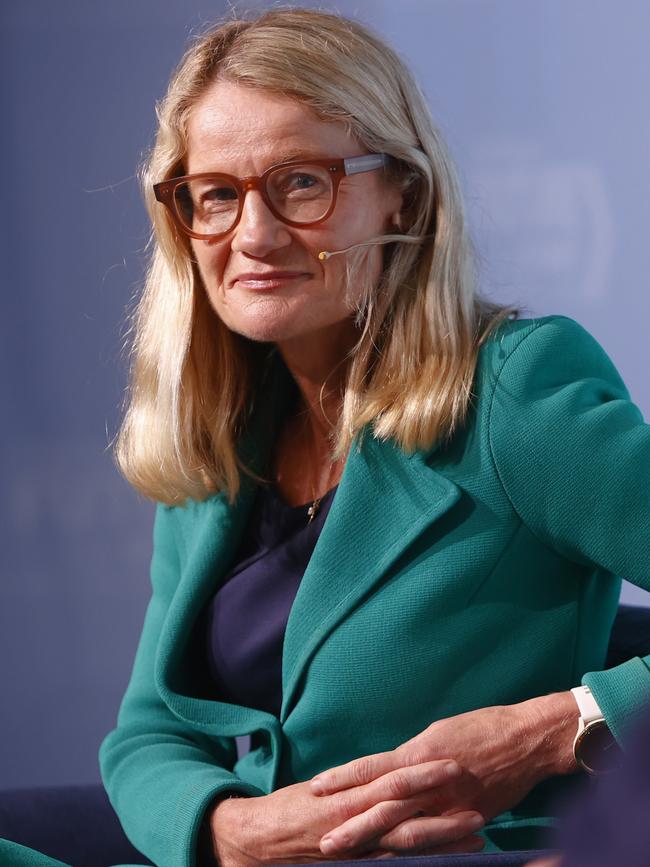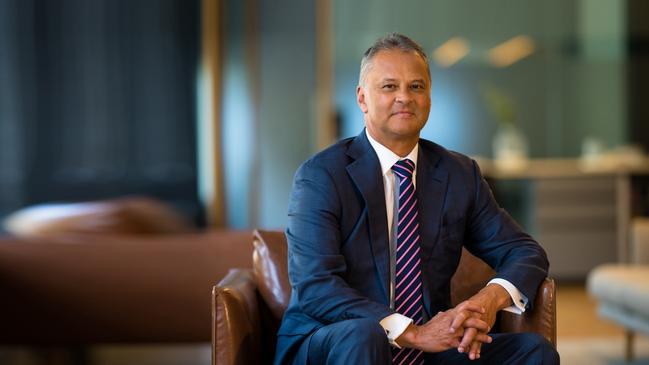Super funds say their spending on external sources such as sponsorships reap benefits
The nation’s largest super funds have defended their spending habits on non-core business, such as sporting sponsorships, but APRA is not so certain about the benefits.

The nation’s largest super funds have defended how they spend members’ money, insisting that a focus purely on costs risks missing the point on the benefit to net returns.
Aware Super chief executive Deanne Stewart on Tuesday said her fund’s sponsorship of the GWS Giants AFL football team, signed this year, was “very good value for money” as the fund sought to boost its membership numbers in the Western Sydney corridor.
“I would say we do need to be judicious in the way that we use money wisely. But at the same time we are investing,” Ms Stewart told the AFR’s banking and wealth summit.
“We are investing in our investment teams, processes, systems, to make sure that the experience is great and the net returns are as strong as they can be. So there is expenditure needed.


“When we looked at the Giants, we felt that it was very good value for money for what we were looking to do, particularly given that one of the areas that we’re wanting to focus on is the Western Sydney corridor … so it was very deliberate.”
As the industry braces for the first in-depth super fund expense data to be released on Wednesday, following a multi-year project by the Australian Prudential Regulation Authority, other super funds were quick to caution against too great a focus on costs, which they said risked coming at the expense of member returns.
The nation’s second-largest fund, the $300bn Australian Retirement Trust, said it was delivering a net benefit for members.
“It is about having the right capability, process and governance, and that does require expenditure,” ART chief investment officer Ian Patrick said.
“What we want to do at the end of the day is ensure we are getting a net benefit, whether it’s a net benefit in terms of information flow that allows us to act in real time to rebalance portfolios that mitigate risk (or) whether it’s appropriate expertise to be able to manage those more complex assets.

“We do it each and every day with a view to ‘is this going to bring a net benefit to the outcome in our best estimates’. Sometimes we will be wrong as to the efficacy of that spend, but in our best estimates, if we are going to be able to deliver an enhanced net outcome for members, we will invest.”
CBUS chair Wayne Swan said the fund’s marketing spend was “entirely a legitimate agenda”.
“We’re here for the best financial interests for our members and that means getting the best deal. Not only on what we raise money but how we spend it is just as relevant,” he told the summit.
What we spend on our partnerships, which are the big political target, is one of the most effective ways we can spend invest money to retain and recruit membership.”
IFM Investors chairman Cath Bowtell said a focus on expenditure was important but that it shouldn’t come at the expense of net returns.
“I do think that there is a risk that some of the debate taking place at the moment, which is solely focused on costs, misses the issue about net returns,” she said.
“We do need to make sure that we have sufficient expenditure in the system to keep resilient organisations, to continue to invest in capability and to make sure that we’re able to exploit opportunities as they come up.
“We are complicated, sophisticated, long-term institutional investors and we deal with complexity, and that costs money.”

But UniSuper’s John Pearce took a different view. “I haven’t seen any correlation between spending more and higher alpha. If there was a correlation there we’d be spending like crazy tomorrow – no constraint,” he said.
“The other thing is, as a large super fund, the reality is that one of the core tenants of our value proposition is that we are lower-cost providers of superannuation. Costs are something that we can control. We can’t actually control returns so we do have to keep an eye on (costs).”
Ahead of APRA’s publication of super fund expense data this week, deputy chair Margaret Cole revealed funds spent $10.83bn in the 2022–23 financial year, with investment spend at 33 per cent of the total, advice at 11 per cent and “administration and other expenses” making up the bulk of the spend, at 53 per cent.
Ms Cole repeated the threat of enforcement action against inappropriate super fund spending, saying some funds were still making questionable expenditure decisions and had variable compliance with the best-interests duty.

“Sports conference sponsorships, conferences, travel, discretionary expenditure … sometimes it’s not obvious what benefits that gives to members,” Ms Cole said.
“We understand that expenditure is required and that expenditure on marketing is required, but there are some things that just do not look as if they’re going to pass the test.”
APRA was moving into the enforcement world, she said.
“Over the years disqualification has not been a tool used very much,” Ms Cole said.
“APRA does consider itself a supervision regulator but APRA has flagged now, for a while, that it will use the enforcement tool and … will use it alongside our other tools.
“Where we see information, data and evidence that substantiates and justifies disqualification, action or some other form of penalty, we will move forward to do that.”




To join the conversation, please log in. Don't have an account? Register
Join the conversation, you are commenting as Logout